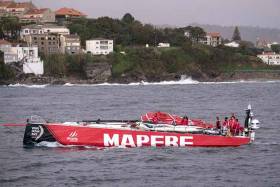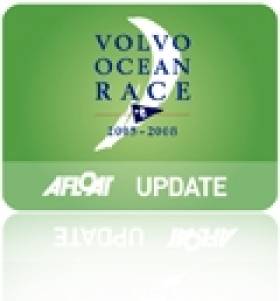Displaying items by tag: MAPFRE
Volvo Ocean Race Entry Mapfre Dismasted
Yesterday afternoon while the Volvo Ocean Race entry Mapfre team was sailing about seven nautical miles SW of the island of Ons (Pontevedra) near their home base in around 25–knots of wind and four meter high waves the VO65 MAPFRE's mast broke below the first spreader.
"There was a crash and then the rig started to fall to starboard," reported Pablo Arrarte, MAPFRE's watch captain who was sailing as skipper of the boat during this period of testing. "We were sailing on quite a comfortable reach with waves also from the same direction and so at the moment we do not know why it has broken. We will have to analyse the data and the damaged parts in order to draw a conclusion."
The crew have not suffered any injuries and after fully checking for any collateral damage to other parts of the boat it took around two hours of intense work to secure the boat and recover the broken parts of the mast and the sails.
The team's emergency protocol was activated immediately and for safety reasons, Salvamento Marítimo [Maritime Rescue] was notified. They monitored the Spanish VO65 and when the crew had secured the boat the emergency services were duly informed that the crew were heading back to Sanxenxo under their own means.
The broken mast is the one used in the last Volvo Ocean Race 2014-15
Spanish Win Latest VOR Leg As Top 3 Finish Within 8 Minutes
#VOR - MAPFRE have crossed the line at Auckland to take victory in the fourth leg of the 2014-15 Volvo Ocean Race, just minutes ahead of their closest rivals Abu Dhabi Ocean Racing – with Irish bowman Justin Slattery among her crew – and Leg 3 winners Dongfeng Race Team.
Indeed, only eight minutes separated the three yachts as they sailed into the Viaduct Harbour in New Zealand's largest city just over an hour ago. And Team Alvimedica were not far behind, crossing the line within the last few minutes.
What's more, there's still a battle to escape last place, as Team Brunel and Team SCA were just nine nautical miles apart according to the most recent live tracker update.
"Today is a very good day for the team!" said MAPFRE skipper Xabi Fernandez as his boat and crew reached the finish line at 9.31pm local time.
And there were no hard feelings from second-place Abu Dhabi, with skipper Ian Walker saying he was "very pleased for Xabi" after "a very, very exciting finish, and a few nerve-wracking days."
The result marks an incredible change in fortunes for the Spanish team, who finished dead last in Cape Town after the first leg but steadily improved their form as the fleet traversed the Indian Ocean and the South China Sea towards the Pacific.
The Volvo Ocean Race website has much more on the story HERE.






























































